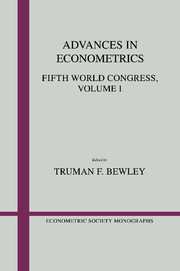Book contents
- Frontmatter
- 1 Specification testing in dynamic models
- 2 Specification tests: an overview
- 3 Kernel estimators of regression functions
- 4 Identification and consistency in semi-nonparametric regression
- 5 On econometric models with rational expectations
- 6 Calculating asset prices in three example economies
- 7 The Kalman filter: applications to forecasting and rational-expectations models
- 8 Applications of the Kalman filter in econometrics
6 - Calculating asset prices in three example economies
Published online by Cambridge University Press: 05 January 2013
- Frontmatter
- 1 Specification testing in dynamic models
- 2 Specification tests: an overview
- 3 Kernel estimators of regression functions
- 4 Identification and consistency in semi-nonparametric regression
- 5 On econometric models with rational expectations
- 6 Calculating asset prices in three example economies
- 7 The Kalman filter: applications to forecasting and rational-expectations models
- 8 Applications of the Kalman filter in econometrics
Summary
The purpose of this chapter is to deduce asset prices in three intertemporal models. The models we consider have the following attributes:
(i) preferences of consumers aggregate in the sense of Gorman (1953);
(ii) there is a complete set of competitive markets for date- and state-contingent commodities.
These two features simplify calculation of the competitive equilibrium because aggregate equilibrium quantities can be computed by solving a single-agent (representative consumer) resource allocation problem. The second feature introduces a rich variety of securities whose equilibrium prices are to be derived. Both of these attributes are quite restrictive. Models with these attributes, however, are interesting benchmarks for other models in which fewer restrictions are imposed on preferences or in which markets are incomplete either because of limitations in communication or commitment or because of the existence of private information.
This chapter focuses on calculating asset prices for two reasons. First, it is of pedagogical value to examine environments in which asset prices have explicit representations in terms of the underlying state variables of the economy. For example, such representations help characterize the implications for asset pricing of intertemporal specifications of preferences. Second, the ability to calculate equilibrium prices facilitate the analysis of asset-pricing models using econometric methods.
- Type
- Chapter
- Information
- Advances in EconometricsFifth World Congress, pp. 207 - 244Publisher: Cambridge University PressPrint publication year: 1987
- 10
- Cited by



